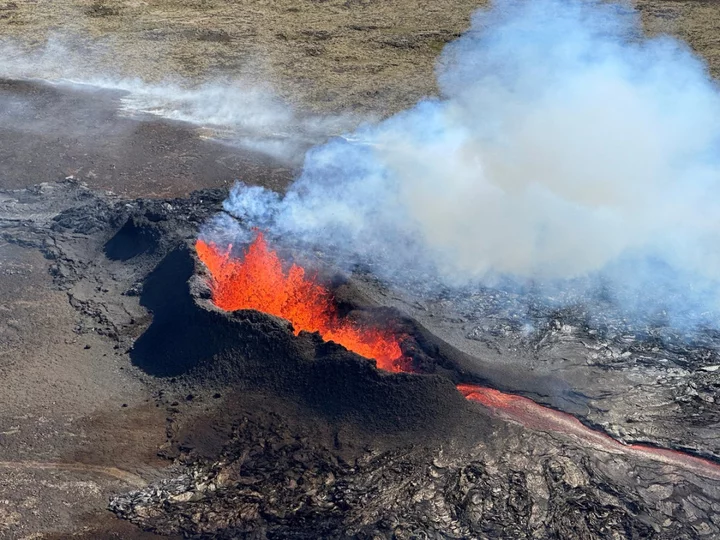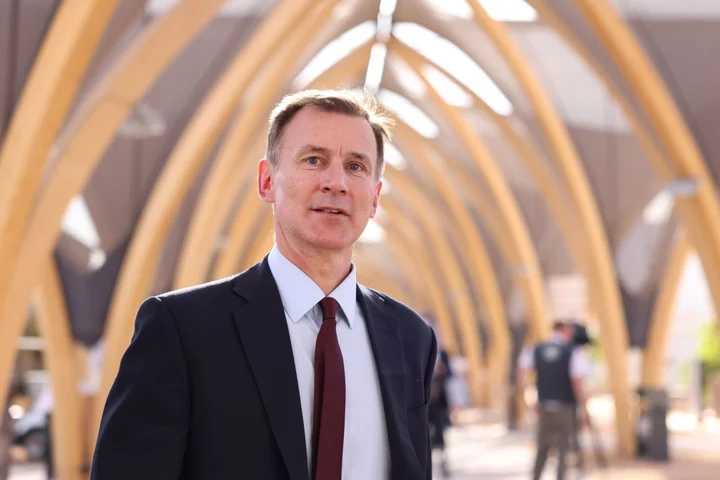
US House Speaker Johnson unveils a two-step stopgap bill - media
WASHINGTON (Reuters) -U.S. House of Representatives Speaker Mike Johnson on Saturday announced a two-step temporary funding measure aimed at averting
2023-11-12 04:52

Iceland volcano could erupt ‘within hours’, expert warns
Iceland is bracing itself for a volcanic eruption that will arrive within “hours or days”, experts have warned. Around 3,000 residents have evacuated the southwestern town of Grindavik close to the Fagradalsfjall volcanic system in the Reykjanes region. Over the past 48 hours, Iceland has faced a seismic swarm as 1,485 earthquakes have hit the country. In addition, a magma tunnel is forming underground beneath the town, which South Iceland’s Volcano and Natural Hazards group believe could be 12km long. The UK foreign office has updated its travel advice, warning that a volcanic eruption is increasingly likely, but it has not warned against travel with flights still touching down at Keflavik International Airport. The Icelandic Meteorological Office said on Saturday there was a “considerable” risk of an eruption on the Reykjanes peninsula because of the size of the underground magma intrusion and the rate at which it was moving. Iceland is highly susceptible to natural disasters as it lies on the Mid-Atlantic Ridge – a divergent plate boundary where the North American Plate and the Eurasian Plate are moving away from each other, leading to volcanic eruptions and earthquakes. “I don’t think it’s long before an eruption, hours or a few days. The chance of an eruption has increased significantly,” Thorvaldur Thordarson, professor of volcanology at the University of Iceland, told state broadcaster RUV. Páll Einarsson, professor emeritus in geophysics, told RUV: “Considering the intensity, it must be considered probable that there will be an eruption from this magma tunnel, but it is impossible to say where and how long that fissure will be.” Despite the imminent threat of a volcanic eruption, the UK Foreign Office has not warned against travel to the region. Its official warning reads: “Earthquakes and indications of volcanic activity have increased above normal levels on the Reykjanes peninsula, southwest of Reykjavik. “The Icelandic authorities continue to monitor the area closely, particularly the area northwest of Mt Thorbjörn near the Svartsengi power plant and the Blue Lagoon. On 10 November, a Civil Protection Alert was declared after an intense swarm of earthquakes.” The Reykjanes region has in recent years seen several eruptions in unpopulated areas, but the current outbreak is believed to pose an immediate risk to the town, authorities said. On Thursday, increased seismic activity prompted the closure of the Blue Lagoon geothermal spa, one of the country’s main tourist attractions. Reykjanes is a volcanic and seismic hot spot southwest of the capital Reykjavik. In March 2021, lava fountains erupted spectacularly from a fissure in the ground measuring between 500-750 metres long in the region’s Fagradalsfjall volcanic system. Volcanic activity in the area continued for six months that year, prompting thousands of Icelanders and tourists to visit the scene. In August 2022, a three-week eruption happened in the same area, followed by another in July of this year. The Fagradalsfjall system, which is around 6km wide and 19km long, had remained inactive for more than 6,000 years prior to the recent eruptions. Read More Iceland evacuates town and raises aviation alert as concerns rise a volcano may erupt Mapped: Iceland earthquake locations revealed as volcano eruption alert issued Iceland earthquakes: Your rights if you are on holiday there or are planning to go Iceland volcano eruption could happen ‘within hours’ as Grindavik evacuate - live Earthquakes in Iceland prompt fears of volcano eruption Iceland's Blue Lagoon spa closes temporarily as earthquakes put area on alert for volcanic eruption
2023-11-12 03:26

Blue plaque honour for Fermanagh World War Two heroine
Historians and relatives gather in Derrylin to commemorate the "amazing" life of Monica de Wichfeld.
2023-11-12 02:25

International mafia bust shows US-Italy crime links still strong
While decades of prosecutions weakened the US and Italian mafia, transatlantic relations remain strong.
2023-11-12 01:29

Luis Díaz's father speaks for first time since kidnap
The Liverpool FC footballer's father spoke of his plight after being held by Colombian guerrillas.
2023-11-12 00:53

Xi Jinping’s ‘Old Friends’ from Iowa Invited to Dinner With Him
A group of Chinese President Xi Jinping’s “old friends” from Iowa have been invited to a dinner he
2023-11-12 00:29

Hundreds of Thousands March in London to Protest the War in Gaza
More than 300,000 protesters gathered in London for a pro-Palestinian march that’s turned into a divisive political issue
2023-11-12 00:27

One Year After FTX Imploded, Here’s How Crypto Is Changing
For many who trade cryptocurrencies for a living, the events of a year ago are forever etched in
2023-11-11 23:24

Hunt Set to Extend UK Business Tax Break in Bid to Lift Growth
Chancellor of the Exchequer Jeremy Hunt is set to extend a major tax break for businesses in his
2023-11-11 22:55

Pope Francis fires Texan bishop after criticism of reforms
Joseph Strickland is "relieved" from governance following a Vatican investigation.
2023-11-11 22:55

Obesity drug Wegovy cut risk of serious heart problems by 20%, study finds
A new large study finds that the popular weight-loss drug Wegovy reduced the risk of serious heart problems by 20% in certain patients
2023-11-11 22:21

What are the symptoms of Parkinson’s disease and how can it be treated?
Parkinson’s disease is the world’s second most common neurodegenerative disorder, behind Alzheimer’s disease. While it’s unknown exactly why people develop the condition, according to Parkinson’s UK, experts believe its a combination of genetic and environmental factors that contribute to the damage of nerve cells in the brain. So what are the symptoms of Parkinson’s disease and how can it be treated? Here’s everything you need to know. What is Parkinson’s disease? Parkinson’s disease is a degenerative neurological condition. This means that over time the brain of an individual living with the disease becomes more damaged, the NHS explains. A person living with Parkinson’s disease doesn’t have enough of the chemical dopamine in their brain, the Parkinson’s Foundation states. Dopamine is responsible for transmitting signals between nerve cells in the brain. When an individual experiences a loss of nerve cells in the brain, this causes a reduction in the quantity of dopamine in the brain. What are the symptoms? The main symptoms of Parkinson’s disease include involuntary shaking (otherwise known as tremors), movement that’s slower than usual and stiffness in the muscles, the NHS outlines. Other symptoms may include difficulty balancing, nerve pain, incontinence, insomnia, excessive sweating, depression and anxiety. For more information about the symptoms of Parkinson’s disease, visit the NHS here. How many people does it affect? Around 145,000 people in the UK are affected by Parkinson’s disease, Parkinson’s UK explains. This means that around one in every 350 adults is living with the degenerative condition. According to the NHS, symptoms of Parkinson’s usually develop after the age of 50. However, for every one in 20 people affected by the disease, symptoms may appear when they’re under the age of 40. The Parkinson’s Foundation outlines that men are 1.5 more likely than women to be affected by the condition. High-profile individuals to have been diagnosed with Parkinson’s include former US president George H. W. Bush, Back to the Future star Michael J. Fox and The Chase star Paul Sinha. How can it be treated? While there is no known cure for Parkinson’s disease, symptoms may be controlled through treatment. The most common form of treatment used for the condition is medication, Parkinson’s UK states. “Drug treatments aim to increase the level of dopamine that reaches the brain and stimulate the parts of the brain where dopamine works,” the charity explains. The medication used to treat Parkinson’s disease varies according to each patient. This is because as symptoms of the disorder progress, the drugs used to treat the condition may need to be changed. While drug treatment may help to manage Parkinson’s symptoms, it cannot slow the progression of the disease. The NHS explains that those living with Parkinson’s disease may also undergo physiotherapy, occupational therapy, and, in rare cases, brain surgery to treat the condition. For more information about Parkinson’s disease, visit Parkinson’s UK. Read More What are symptoms of coronavirus – and where has it spread? Latest travel updates as coronavirus continues to spread Can face masks really protect you against coronavirus or flu? The dirty truth about washing your hands Billy Connolly shares health update on Parkinson’s disease: ‘Every day gets stranger’ Tracey Emin says she ‘totally accepted death’ following cancer diagnosis Nicky Hilton calls out critics who made negative comments about nephew Phoenix’s head
2023-11-11 21:28
